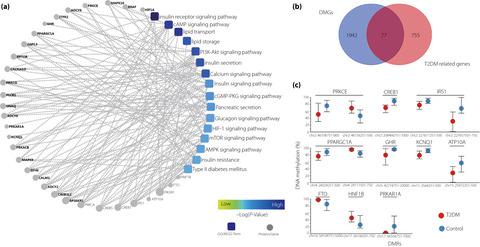当前位置:
X-MOL 学术
›
J. Diabetes Investig.
›
论文详情
Our official English website, www.x-mol.net, welcomes your feedback! (Note: you will need to create a separate account there.)
Whole genome bisulfite sequencing of human spermatozoa reveals differentially methylated patterns from type 2 diabetic patients.
Journal of Diabetes Investigation ( IF 3.2 ) Pub Date : 2020-02-03 , DOI: 10.1111/jdi.13201 Xiongfeng Chen 1 , Qinghua Lin 2 , Junping Wen 3 , Wei Lin 3 , Jixing Liang 3 , Huibin Huang 3 , Liantao Li 3 , Jianxin Huang 4 , Falin Chen 4 , Deli Liu 5 , Gang Chen 2, 3
Journal of Diabetes Investigation ( IF 3.2 ) Pub Date : 2020-02-03 , DOI: 10.1111/jdi.13201 Xiongfeng Chen 1 , Qinghua Lin 2 , Junping Wen 3 , Wei Lin 3 , Jixing Liang 3 , Huibin Huang 3 , Liantao Li 3 , Jianxin Huang 4 , Falin Chen 4 , Deli Liu 5 , Gang Chen 2, 3
Affiliation

|
The incidence of type 2 diabetes mellitus is increasing worldwide, and it might partly cause metabolic disorder and type 2 diabetes mellitus susceptibility in patients’ offspring through epigenetic modification. However, the underlying mechanisms remain largely unclear. Recent studies have shown a potential link between deoxyribonucleic acid methylation in paternal sperm and susceptibility to type 2 diabetes mellitus in offspring, so this article focuses on whether the whole‐genome methylation profiles of spermatozoa in type 2 diabetes mellitus patients have changed.
中文翻译:

人类精子的全基因组亚硫酸氢盐测序揭示了来自 2 型糖尿病患者的差异甲基化模式。
2型糖尿病的发病率在全球范围内呈上升趋势,可能通过表观遗传修饰部分导致患者后代代谢紊乱和2型糖尿病易感性。然而,潜在的机制在很大程度上仍不清楚。最近的研究表明父本精子中的脱氧核糖核酸甲基化与后代对 2 型糖尿病的易感性之间存在潜在联系,因此本文重点关注 2 型糖尿病患者精子的全基因组甲基化谱是否发生了变化。
更新日期:2020-02-03
中文翻译:

人类精子的全基因组亚硫酸氢盐测序揭示了来自 2 型糖尿病患者的差异甲基化模式。
2型糖尿病的发病率在全球范围内呈上升趋势,可能通过表观遗传修饰部分导致患者后代代谢紊乱和2型糖尿病易感性。然而,潜在的机制在很大程度上仍不清楚。最近的研究表明父本精子中的脱氧核糖核酸甲基化与后代对 2 型糖尿病的易感性之间存在潜在联系,因此本文重点关注 2 型糖尿病患者精子的全基因组甲基化谱是否发生了变化。

























 京公网安备 11010802027423号
京公网安备 11010802027423号